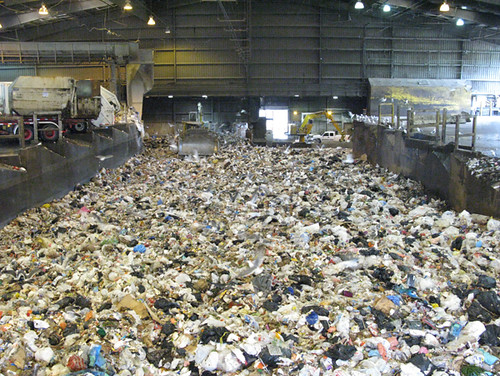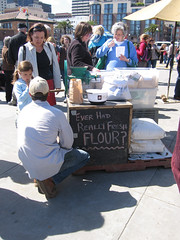From plastic garbage in the middle of the Pacific and raging forest fires to the extraction and burning of fossil fuels, hardly a day goes by without mother Earth’s feedback to our unsustainable human ways. In an ironic twist of cause and effect, the very things that have enabled us to become ostensibly independent of nature — our cars, planes, big agriculture, and air-conditioned suburban settlements — are bringing us back to the timeless understanding that our own fate on a planet with limited resources is intrinsically linked to an equilibrium of living creatures and organic matter.
We’ve all come to cherish our independence from the toils of pre-industrial life, and nobody wants to turn back the clock. However, we have arrived at a junction where we are asked to move beyond the dependence vs. independence paradigm, into a realm of interdependence. A progressive dinner is one such example of how to evolve in that direction.
 It’s really not that complicated: We do not have the resources on this planet — the oil, the metals, the water, the forests, the soil — to continue the wasteful lifestyles we’ve become accustomed to. No matter how hard we try, our perceived independence is only momentary and limited in scope, fueled by the burning of carbon it took millions of years to form. While technological advances in making clean sustainable sources of energy like solar and wind power more efficient and readily available are very important, the notion that we could maintain our current standard of living on a mass scale without any fundamental changes to the ways in which we relate to one another is, quite frankly, wishful thinking.
It’s really not that complicated: We do not have the resources on this planet — the oil, the metals, the water, the forests, the soil — to continue the wasteful lifestyles we’ve become accustomed to. No matter how hard we try, our perceived independence is only momentary and limited in scope, fueled by the burning of carbon it took millions of years to form. While technological advances in making clean sustainable sources of energy like solar and wind power more efficient and readily available are very important, the notion that we could maintain our current standard of living on a mass scale without any fundamental changes to the ways in which we relate to one another is, quite frankly, wishful thinking.
While some of the causes related to climate change are very complex and can be overwhelming to the individual, some of the solutions are much more simple and within everyone’s personal reach. Similar to the political process, We the People have a lot more power to change The Way Things Are than we’d like to believe. Since The Way Things Are is not an option for humanity’s future on planet Earth, we need to use our creativity and imagination to find new ways that are more in rhythm with Mama Earth’s beat. Changing the way we eat, the most basic shared human experience, is a logical step to new ways of being, and a shared meal is a ripple in this sea of change. But before we can envision this change, we must understand that we are all in the same boat.
We All Need Someone to Talk to
I understand the appeal of independence, of getting in your car and driving wherever you want whenever you want it. I understand the thrill of booking a cheap last minute flight to the other side of the world, and completing a trip that 200 years ago would have taken a lifetime, in a weekend. I understand the convenience of grabbing a quick bite to eat at a fast food place because cooking is so time-consuming and I have at least 50 things to do that seem more important (like writing this essay).
 What strikes me as interesting though is that despite our fossil-fueled independence that has enabled us to live in big climate- and remote-controlled homes without ever interacting with anyone in our vicinity we are still essentially social beings, wanting to connect with one another and share our experiences on this planet. Thus we are here on the internet, talking to one another while sitting alone in front of our computers. Thus we are on our cellphones, trying to connect with one another while the rest of the world drives by. We’ve got hundreds of friends on facebook and we intimately know the characters on our favorite sitcom, but we often don’t know our neighbor’s name.
What strikes me as interesting though is that despite our fossil-fueled independence that has enabled us to live in big climate- and remote-controlled homes without ever interacting with anyone in our vicinity we are still essentially social beings, wanting to connect with one another and share our experiences on this planet. Thus we are here on the internet, talking to one another while sitting alone in front of our computers. Thus we are on our cellphones, trying to connect with one another while the rest of the world drives by. We’ve got hundreds of friends on facebook and we intimately know the characters on our favorite sitcom, but we often don’t know our neighbor’s name.
I’m saying all this because I believe that our yearning and need for community is going to play a big part in successfully navigating into a post- or low fossil-fuel world. We want to be together. We want to relate, see the other in ourselves. We like to argue with each other, and we like to support each other. We want to share with one another, and since we often don’t have time to share, we share stuff that nobody really needs, which in turn creates more trash and greenhouse gases. But the core root of it all is that we have an innate human need to engage with one another, to inter-depend.
Pillars of Interdependence
 The simple and universal truths about what’s important in life are right in front of us, and always have been. And yet, we have created the most complex and energy-intensive infrastructure imaginable to fulfill our simple desire not only to survive but to connect and be each others’ mirror in this world. Keeping this very premise of our shared humanity in mind, the physical changes that are necessary for us to live in harmony with our planet’s ecosystem must be predicated on a shift in consciousness. Here are three simple human pillars (or meditations) that should be integral to any technological advances and policy changes:
The simple and universal truths about what’s important in life are right in front of us, and always have been. And yet, we have created the most complex and energy-intensive infrastructure imaginable to fulfill our simple desire not only to survive but to connect and be each others’ mirror in this world. Keeping this very premise of our shared humanity in mind, the physical changes that are necessary for us to live in harmony with our planet’s ecosystem must be predicated on a shift in consciousness. Here are three simple human pillars (or meditations) that should be integral to any technological advances and policy changes:
1) Slowing Down
2) Sharing Resources
3) Focusing on Basics
So how do we create the kind of communities that honor these seemingly pre-industrial principles in ways that reflect and complement our industrialized realities? Or put differently, how do we get millions of highly individualized citizens into contributing time to and pooling more resources with their immediate neighbors and community?
It All Starts with Food
Throughout human history, food and eating have been the binding glue of cultures around the world.  In more traditional societies, food combines our basic need for survival with our need to be social and find meaning in life. Within a system of extended families, cooking large meals that can take days to prepare is not only the most economic way of maximizing protein and carbohydrates, but it creates an infrastructure of social engagement, family support, and cultural identity.
In more traditional societies, food combines our basic need for survival with our need to be social and find meaning in life. Within a system of extended families, cooking large meals that can take days to prepare is not only the most economic way of maximizing protein and carbohydrates, but it creates an infrastructure of social engagement, family support, and cultural identity.
From trips to local markets to prepping fresh ingredients, from exchanging family recipes to gathering everyone around the dinner table, providing fresh meals for a large clan is nourishment, education, and entertainment all rolled into one. In the context of shrinking global resources, environmental degradation, and global warming, a food-based culture has implicit benefits that go to the heart of our current crisis.
Think about it:
- Every time we shop for fresh food from local growers we aren’t shopping for stuff we don’t need.
- Every time we prepare and eat home-cooked meals we are not consuming industrially-grown, energy-intensive fast foods.
- Every time we learn a new recipe from a family member, farmer, or friend we become less dependent on low-nutrition processed foods.
- Every time we sit around the dinner table with family and friends we aren’t using resource-depleting machines like TVs, laptops, and other electronic gadgets.
- Every time we eat leftovers from yesterday’s family feast we aren’t driving to the supermarket to grab a quick prepackaged snack.
 This list goes on, but I think the point is clear: Having a culture based around freshly prepared food for a large group of people addresses so many of our other environmental problems, simply because it focuses on basic needs, slows us down, and invites us to share precious resources. It is of course no coincidence that countries with the most intact communal and extended family cultures have the lowest carbon footprint, and the more westernized and individualized a culture gets, the higher their CO2 output.
This list goes on, but I think the point is clear: Having a culture based around freshly prepared food for a large group of people addresses so many of our other environmental problems, simply because it focuses on basic needs, slows us down, and invites us to share precious resources. It is of course no coincidence that countries with the most intact communal and extended family cultures have the lowest carbon footprint, and the more westernized and individualized a culture gets, the higher their CO2 output.
As I mentioned at the top, to go back to a more traditional society is neither realistic nor desirable. The last thing we need is the overall population growth inherent in having extended families of kin. However, what we can do is to take the positive aspects of the traditional, mutually dependent family network and weave it into the threads of our more independent Western arrangements by connecting individuals and small families with each other, sharing work and pooling resources on a voluntary basis.
The Lonelyvore’s Dilemma
 We’ve all been there: You come home after a long day at work, open the fridge, and are greeted by a limp head of lettuce and the crusty pot of pasta from three nights ago. Maybe you live by yourself, maybe you live with your partner or roommate, maybe you have a small family, but there’s simply no way you’re going to come up with a home-cooked dinner tonight. You know you should probably eat a nice nutritious meal, especially after the stressful day you’ve had, but you’re starving and the frozen pizza is looking pretty good. You wolf down that pie just in time to collapse into your couch and watch your favorite TV show.
We’ve all been there: You come home after a long day at work, open the fridge, and are greeted by a limp head of lettuce and the crusty pot of pasta from three nights ago. Maybe you live by yourself, maybe you live with your partner or roommate, maybe you have a small family, but there’s simply no way you’re going to come up with a home-cooked dinner tonight. You know you should probably eat a nice nutritious meal, especially after the stressful day you’ve had, but you’re starving and the frozen pizza is looking pretty good. You wolf down that pie just in time to collapse into your couch and watch your favorite TV show.
This is a fairly standard scenario all across the western civilized world, give or take a few details. For most of us, buying, preparing and eating food is just one of many activities in a busy day, and if there weren’t the annoyance of growling stomachs we would probably vote for eliminating eating altogether. And who could blame us? Cooking fresh food for yourself or just a couple of people takes a lot of time and energy, and if you don’t want to waste a bunch of food you’ll be eating that head of cabbage or broccoli till it comes out your ears or it wilts in your tupperware.
While it’s not impossible to have a satisfying, nutritious and fun dinner alone or in a small circle, it’s probably fair to say that a lot of us Westerners experience our most social and fun meals when we dine out. And because it’s often cheaper to eat out than to cook a lonesome meal from scratch, restaurants of all types have become our de facto dining rooms, the place we meet our friends and find community. What if we skipped the extra trip to the restaurant, didn’t buy the frozen pizza, and created a mobile community at home? Welcome to the progressive dinner!
The Progressive Dinner
According to wikipedia,
A progressive dinner is a dinner party in which each successive course is prepared and eaten at the residence of a different host.
However, based on my own experience and more in sync with the topics discussed above, I’d like to modify the definition:
A progressive dinner is a dinner party in which each successive course is prepared and eaten at the residence of different hosts who live within walking distance of each other.
 Each household is responsible for making only one course, such as appetizer, starter, main course, or dessert, and between courses the whole group walks to the next destination. This not only reduces the amount of prep and cleaning involved for each party, but allows time for digestion between courses and is a guaranteed source of inspiration and fun for all involved.
Each household is responsible for making only one course, such as appetizer, starter, main course, or dessert, and between courses the whole group walks to the next destination. This not only reduces the amount of prep and cleaning involved for each party, but allows time for digestion between courses and is a guaranteed source of inspiration and fun for all involved.
 There aren’t a lot of rules other than that it should be a local affair and that the food has to be prepared with love, and whenever possible, with fresh local ingredients. This makes it a perfect event for independently-minded yet community-seeking spirits. Participants may keep their course a secret until the guests arrive, or you may jam on a theme or particular cuisine.
There aren’t a lot of rules other than that it should be a local affair and that the food has to be prepared with love, and whenever possible, with fresh local ingredients. This makes it a perfect event for independently-minded yet community-seeking spirits. Participants may keep their course a secret until the guests arrive, or you may jam on a theme or particular cuisine.
 In the run-up to our inaugural progressive dinner our group had strong supporters of both approaches and wound up integrating an Indian theme with a bit of beautiful hybrid suspense. It was a perfect symphony of foods and flavors: Samosas and chutneys made from scratch for appetizers, Garam Masala turkey meatballs for starters, delicious Dal for the main course, and a rose water and cardamom panna cotta for dessert. In between, mojitos granitas as palate cleansers.
In the run-up to our inaugural progressive dinner our group had strong supporters of both approaches and wound up integrating an Indian theme with a bit of beautiful hybrid suspense. It was a perfect symphony of foods and flavors: Samosas and chutneys made from scratch for appetizers, Garam Masala turkey meatballs for starters, delicious Dal for the main course, and a rose water and cardamom panna cotta for dessert. In between, mojitos granitas as palate cleansers.
 Coming up with your own personal twists and turns is all part of making the process of eating as much of an attraction as the food itself, invoking the old adage “it’s not where you’re going, but how you get there.” There’s something exciting and almost subversive about getting up after your appetizer and marching over to the next house with a gang of giddy friends and neighbors. The laughter was just a bit louder and more uninhibited than usual, the acknowledgments of each others’ contributions just a bit more heartfelt than at a conventional dinner party. We were all hosts and guests at the same meal, which is probably as close to describing the meaning of community as I can come. Next up in October? German, what else!
Coming up with your own personal twists and turns is all part of making the process of eating as much of an attraction as the food itself, invoking the old adage “it’s not where you’re going, but how you get there.” There’s something exciting and almost subversive about getting up after your appetizer and marching over to the next house with a gang of giddy friends and neighbors. The laughter was just a bit louder and more uninhibited than usual, the acknowledgments of each others’ contributions just a bit more heartfelt than at a conventional dinner party. We were all hosts and guests at the same meal, which is probably as close to describing the meaning of community as I can come. Next up in October? German, what else!
There are a lot of other great ideas and movements surrounding food and community, from Slow Food to Community Supported Kitchen to Eat-Ins, but the progressive dinner is the ultimate in grassroots action and the easiest to put together. No big event organizing or complicated arrangements, just talk to a couple of friends and neighbors and you’re well on the way to sharing a slow evening of eating, drinking, and laughing. It’s so basic, and yet so full and complete.
I know some will say that this is just a drop in the bucket in the larger context of issues like peak oil or climate change. Just file under “fun activity” and be done with it. And viewed from a completely rational, numbers-crunching, parts per million kind of perspective, I don’t blame you. However, on a more instinctive soul level I know that we cannot heal the mothership without healing our own wounds, without celebrating all the wonders and treasures this earth has to offer. We cannot be cosmic worrywarts and let our spirit and inspiration shrink away under the heavy burden of climate models and melting ice caps and expect to somehow create the kind of harmonious interdependence that’s needed to reverse these threats. Or in the words of a 1980s group of philosophers: “We’ve got to dance this mess around!”








What an insightful, soulful article, with the surprise ending of something fun: Progressive Dinners. Sure would break some ice in the apartments where I live.
Thanks for reading the whole piece, I know it’s a bit long for a blog post but I’m jamming on some ideas that I might use for a book at some point.